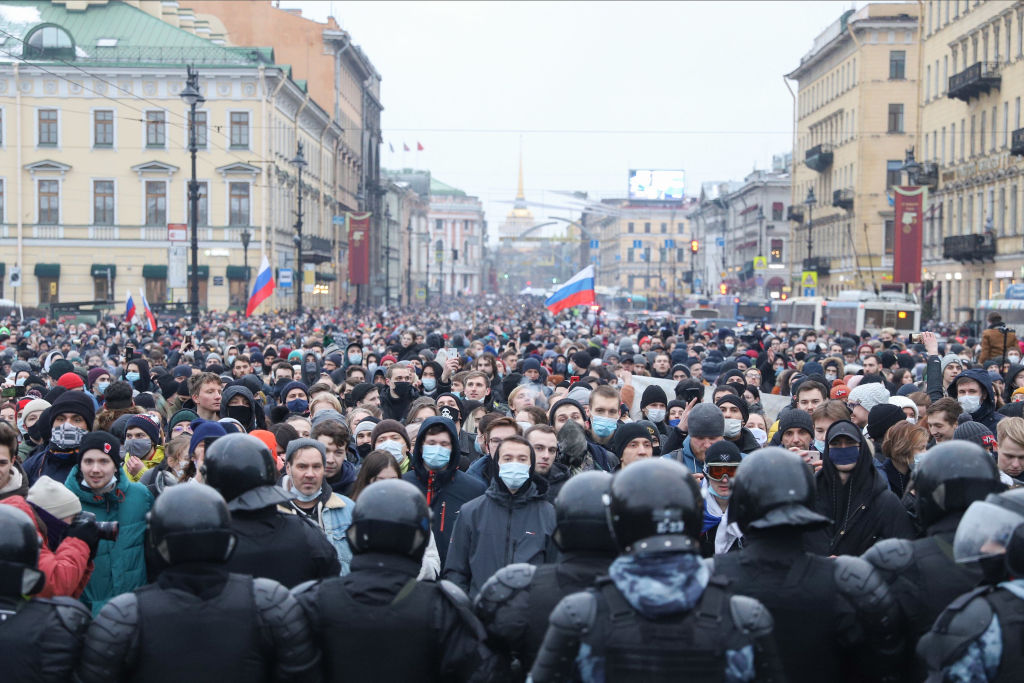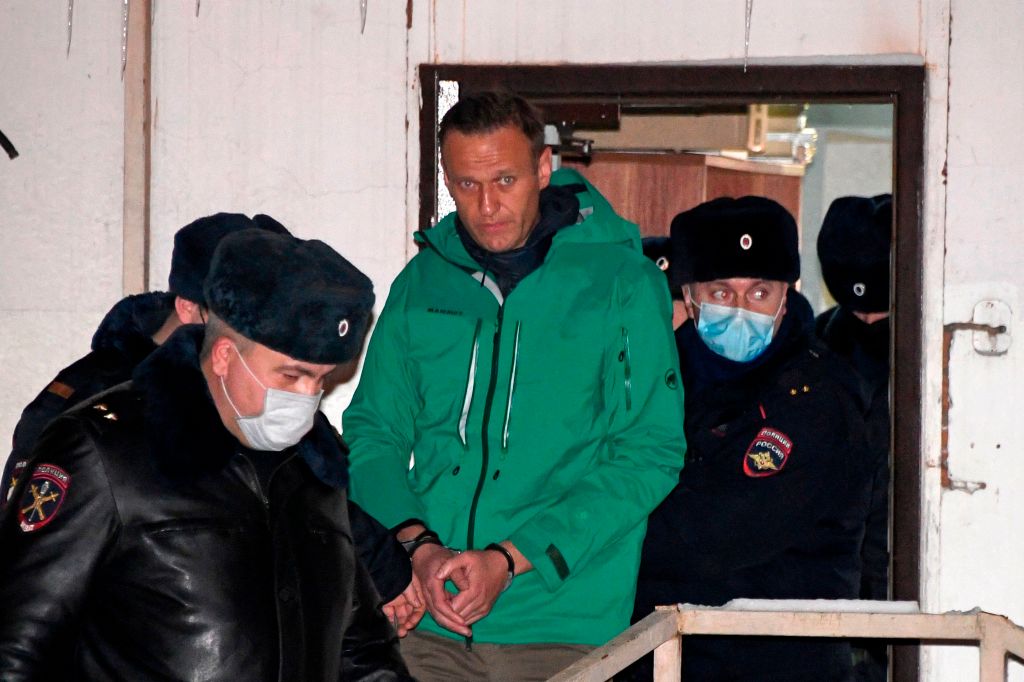
It was minus-61 degrees Fahrenheit in Yakutsk, about 300 miles south of the Arctic Circle, on Saturday, but the people still came. The scene was like something out of a post-apocalyptic movie: a queue of dimly visible figures against the whited-out backdrop of a snow squall. They had come to show solidarity with Alexey Navalny, the imprisoned leader of the Russian opposition, who had been arrested upon his return from Germany where he was recovering from an attempt on his life. Navalny had called for a January 23rd nationwide protest on social media.
So they came, without government permits, all across Russia’s eleven time zones. They were on rooftops in Vladivostok. Protestors thronged the city squares of Novosibirsk and Irkutsk, where they chanted “We will not leave.” Authorities roughed them up, even the kids, in Moscow, where as many as 20,000 turned out, some to chant the common refrain “Putin is a thief!;” others to pelt riot police with snowballs. In St. Petersburg, during daylight hours, one young couple carried flowers and told reporters they were on a date; in the same city, after nightfall, a cop kicked an elderly woman in the stomach, launching her backward, onto the ground. (She’d simply asked why he and his colleague were detaining another demonstrator.) In all, a reported 3,000 Russians across 100 cities were arrested this weekend on behalf of one man.
Who is Navalny? To the Kremlin, officially, he’s either a nonentity, a convicted fraudster, or a dangerous CIA agent sent to foment regime change, or all of the above. To Westerners, he’s the dissident who survived a state assassination plot, then helped solve his own attempted murder. To millions of Russians, Navalny is the country’s most famous and persistent gadfly, the unavoidable vivisectionist of its crooked ruling class. He’s also very funny.
The videos his Anti-Corruption Foundation put out mix satire, pop culture, and zippy animation with a connect-the-dots forensic approach to exposing oligarchs, ministers and law enforcement officials, who aren’t exactly hiding their ill-gotten gains by showing up in public with wristwatches worth many times their annual salaries. If there’s a theme to Navalny’s oeuvre, it is that Russia’s modern kleptocracy is the offspring of an unholy matrimony between former mid-level KGB officers and a post-Soviet nomenklatura of bandits in business suits. Both species, he insists, are singularly embodied in Vladimir Putin.
As Navalny sat in his Moscow jail cell, the Anti-Corruption Foundation released a two-hour video he’d recorded in Germany about a corruption scandal implicating Putin, which had originally been brought to light ten years ago. The new video, “Putin’s Palace: History of the World’s Largest Bribe,” has been viewed more than 100 million times and counting, and is astonishing in its tawdry revelations. Relying on leaked architectural plans, the testimony of former project insiders, and drone aerial footage, Navalny narrates how Putin has built himself the world’s biggest private residence on an estate 39 times the size of Monaco. A virtual country-within-a-country, this Xanadu on the Black Sea is inaccessible to the ordinary Russian by land, air or sea and was financed through a complex network of kickbacks from billionaire cronies and misappropriated taxpayer funds. The centerpiece of it all, the eponymous palace, would make a Bond villain wince. An underground hockey rink, an aquadisco, a movie theatre, a private casino, and a velvety hookah lounge outfitted with its own retractable stripper pole. Never has something so cheap cost so much: a cool $1.5 billion. And it all belongs to a “mentally ill” Putin, as Navalny calls him, who is “obsessed with wealth and luxury.”
Putin is also obsessed with keeping his wealth and luxury hidden from view. His motive for ordering an unprecedented influence and interference campaign in the 2016 U.S. presidential election is rumored to have been retaliation. For what? For what Putin believed was Washington’s recondite plot to divulge some of his secret net worth through the “Panama Papers,” in reality a massive journalistic expose based on leaked law firm documents and compiled by hundreds of investigative reporters from around the world. It is unfathomable to the paranoid master of the Kremlin that the mere pursuit of the public interest moves his critics to undertake such muckraking; there are always cynical, powerful forces behind them.
The obvious question, then, was why Navalny chose to go back to Russia after proving just how much his enemies want him dead?
He has repeatedly ruled out becoming another exile of Putin’s regime because, as he explains, that would be its most sought-after outcome after his physical elimination. It’s easy to ridicule and dismiss a Kremlin opponent hurling invective from abroad, but much more difficult to do so when he does so from within the lion’s den. Independent pollsters show Navalny not cracking single digits in his quest for the presidency, though such numbers miss the point. By returning to Moscow, he conducted his own qualitative plebiscite: how much power does he really wield if tens of thousands across Russia are willing to defy truncheons, cages and below-freezing temperatures to set him free?
For one thing, Navalny has put Putin in an obvious bind: killing him now means creating a martyr and precipitating even more domestic unrest, not to mention incurring increased Western sanctions at a time when a new White House has shown a far greater willingness to confront Moscow than its predecessor did. The State Department issued a statement on Jan. 23 calling for Navalny’s release and for the Russian government to respect the right to peaceful assembly. And on Jan. 26, President Biden raised Navalny in his first call with his Russian counterpart.
Older ralliers in the protests said they hadn’t taken to the streets since the collapse of the Soviet Union. By one estimate, nearly half of those who turned out on Saturday are newcomers to political activism. Navalny’s suffering combined with his relentless exposure of corruption—something Putin’s own lieutenants have described as a pathology eating away at the nation—have won him admirers in the unlikeliest precincts of Russia’s vast demography. Children in primary schools were reportedly warned by their teachers not to attend the weekend protests—a haunting throwback to the age of Communist youth indoctrination and intimidation. A large segment of Navalny’s online fan base consists of those who were born after Putin became president for the first time, in 2000. Even North Korea and Syria have seen changes in their dynastic leadership since then.
None of this means that Putin’s reign is in immediate jeopardy. It just means it’s found its most effective opponent. Unlike so many other dissidents in recent years, Navalny is untainted by any past entanglement with the system he now opposes. He never served in the Russian government, nor made a fortune by enabling, only to later repudiate his former masters out of principle or opportunism or a combination of both. Try though his enemies might to silence him, Navalny won’t shut up. And he speaks in a 21st-century, digitally savvy language—mordant, ironic and thoroughly unimpressed by authority—which even some of his detractors must at least find ballsy. More importantly, he gets results.
At a virtual meeting with Russian university students on Jan. 25, Putin was asked about his seaside pleasure dome. Although he couldn’t bring himself to utter Navalny’s name (he never does), he disclaimed ownership of the palace, saying he only saw clips of the video prepared by his assistants. So now the dictator is answering his prisoner’s questions.

In another highly circulated photograph from last week, Navalny was shown sitting at the police station in front of a recognizable portrait on the wall behind him: that of Genrikh Yagoda, Stalin’s secret police chief during the 1930s liquidation of the Old Bolsheviks. (Yagoda, too, was eventually arrested and shot.) No Russian observer will have missed the ominous symbolism: Navalny has willingly put himself at the mercy of a totalitarian security apparatus, the very same one he’s explicitly blamed for corroding all aspects of Russia’s economy and politics and the very same one in which his Putin got his professional start in life.
Navalny is hardly naive about just how vicious and dangerous that apparatus is: he has the medical bills to prove it. But he’s also not afraid. In a clever and darkly comic video released in December, he reconstructed the who, what and why of his own poisoning. The video went viral. He then followed up that intervention with an even more jaw-dropping act of forensic jujitsu, getting one of his would be killers to confess to the crime. Pretending to be a high-ranking member of Russian Security Council, Navalny persuaded FSB officer Konstantin Kudryavtsev to divulge sensitive operational details of the botched assassination, including the article of clothing—Navalny’s underwear—where the Novichok was administered. Putin’s reconstructed Chekist state, with all its irradiated and immolated and bullet-strewn corpses, suddenly seemed ridiculous and pathetic. No one has ever done this before.
And Navalny remains uncowed. On Instagram, from his cell in Moscow’s Matrosskaya Tishina federal prison, where at least one other Russian whistleblower has been tortured to death, he wrote that he had no interest in hanging himself from his window bar or slitting his wrists or throat with a sharpened spoon; nor was prone to a heart attack or some other ailment. If anything should happen to him, in other words…. “I know that outside my jail there are a lot of good people and help will come,” the leader of Russia’s opposition wrote, before signing off with a winky face emoji.
More Must-Reads From TIME
- The 100 Most Influential People of 2024
- Coco Gauff Is Playing for Herself Now
- Scenes From Pro-Palestinian Encampments Across U.S. Universities
- 6 Compliments That Land Every Time
- If You're Dating Right Now , You're Brave: Column
- The AI That Could Heal a Divided Internet
- Fallout Is a Brilliant Model for the Future of Video Game Adaptations
- Want Weekly Recs on What to Watch, Read, and More? Sign Up for Worth Your Time
Contact us at letters@time.com